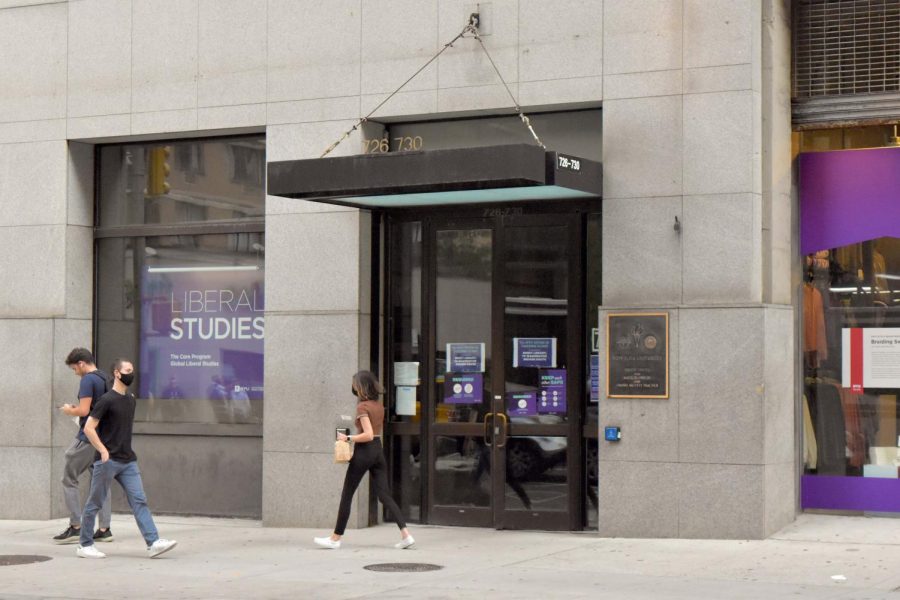Students argue for hybrid mental health services
Meanwhile, a CAS junior is working with Counseling and Wellness Services to hire more counselors and remove insurance copays.
Students have reported that NYU’s Counseling and Wellness Services have improved in the past year. To make it more accessible, the department added 30 counselors and removed the cap on the number of sessions allowed for students. (Photo by Carolina Herrera)
September 23, 2021
LS sophomore Keyana McGuire called the Wellness Exchange’s 24/7 mental health hotline multiple times during her first year at NYU. She was hoping to speak with one of the counselors employed by the Student Health Center’s Counseling and Wellness Services department. But she was often left waiting up to 20 minutes for a response.
“I was like ‘OK, I’ll just cry myself to sleep,’” McGuire said. “They should get more people on staff so that people — even with the chat feature — aren’t waiting to talk to someone.”
Due to COVID-19 concerns, Counseling and Wellness Services is mostly virtual for the fall 2021 semester. But to make the department’s services more accessible and affordable for students, CAS junior Megan Chen — the committee chair for the Health and Wellness Committee in the Student Government Assembly and the senator at-large for mental health — is working with Zoe Ragouzeos, the executive director of Counseling and Wellness Services, to hire more mental health counselors and remove insurance copays.
“The counseling center has, overall, really stepped it up in the last year,” Chen said. “They added 30 counselors last year and they removed the cap [on session limits]. I have had a good experience with the Wellness Center and I really recommend for anyone and everyone to try it.”
Last month, Counseling and Wellness Services added a free 30-minute single-session counseling option for students who need one-time support.
“Since we introduced our virtual service model last year, we have received overwhelmingly positive feedback from our students,” Ragouzeos said. “In fact, in four separate patient satisfaction surveys, 87% of students reported that virtual care is as good or better than face to face.”
Some students, however, expressed mixed feelings about keeping a majority of care remote. Gallatin first-year Rebecca Lipsitch, who has also called the Wellness Exchange for support this semester, said she was glad to receive help, but wishes that more in-person options were available.
“Given that it’s remote, if I had a crisis, I’d probably call someone closer to me first — like a parent or a friend — because there’s often a long wait time with the Wellness Exchange,” Lipsitch said.
Although Lipsitch isn’t planning to continue using the services while they are remote, she is grateful for her positive experience.
“As a new student, I feel like they’ve made themselves super outwardly available and their number is implanted in my head — which is a good thing,” she said. “They also don’t stigmatize [mental health] and I really do feel like they try to share that as much as they can.”
Chen believes that the best way for NYU to move forward would be to implement a hybrid model for services. She noted that there are benefits to in-person counseling that are lost during virtual sessions.
“The Wellness Center is really trying to rebrand itself to be a little bit more accommodating and accessible — especially since the pandemic started,” Chen said. “They’ve moved things virtual which makes it a lot easier for students to get into a therapy appointment.”
Steinhardt senior Haley Nemec said remote counseling allows those who cannot make it to the SHC — including students with disabilities and those in quarantine — to access the resources and care that the SHC provides.
“It’s nice still being able to access services if you’re sick at home,” she said. “Many students like myself have trouble finding therapy or resources covered by our insurance, so having a more accessible resource through school is amazing. I love my therapist and she has been more helpful than outside resources.”
This semester, Counseling and Wellness Services decided to permanently remove a 10-session cap per semester on therapy, after it was temporarily suspended during the spring 2021 semester in light of the pandemic.
“That really allows students to be like ‘OK, I can go to the counseling center and they’re going to work with me for as long as they can,’” Chen said. “I don’t have to worry about switching counselors or packing all of my issues into one little session.”
Chen said she is aware that Counseling and Wellness Services has had a bad reputation in the past, but hopes that the newly implemented changes will improve students’ experiences and encourage more people to make use of mental health services on campus.
Contact Rachel Fadem at [email protected].

























































































































































